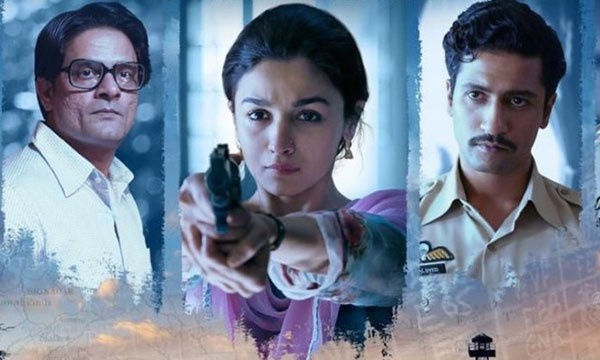By Poulomi Das
In Meghna Gulzar’s Raazi — a fascinating case study of how the director’s female gaze refuses to sexualise the lead — 20-year-old Sehmat (Alia Bhatt) is unsuspectingly forced to inherit the family heirloom: patriotism. Perturbed by the fact that his days are numbered, Hidayat Khan, an Indian double agent, insists his daughter Sehmat carry forward the legacy of subterfuge in Pakistan. It is heartlessly decided that she is to invade homes of the enemy in the disguise of a meek daughter-in-law — wedded to a Pakistani brigadier’s son.
Sehmat’s spadework for a future of Morse code, revolvers, and betrayals comprise a month-long training at the RAW headquarters in Delhi where she meets Khalid Mir (a scene-stealing Jaideep Ahlawat). The trainer is perennially poker-faced and seems unimpressed by Sehmat’s progress. At first glance, the bespectacled man’s sternness can be read as lack of confidence in the capabilities of an elfin college student.
It is only on the last day when he lets his guard down for a concise moment do we realise that it is not the case. Desperate for the intelligence officer’s validation, Sehmat asks him if he believes that she can pull off the mission. Mir looks her in the eye and proclaims that he is sure she can. There is no pride in his eyes as he conveys this, even as Sehmat lets slip a smile. Their exchange has an air of melancholy about it for his face is awash with the acute awareness of what her “pulling off the mission” entails. He is more than familiar with what will eventually be demanded of her and how it will break her. For, as Ahlawat himself claimed in an interview, “Khalid Mir must have been a Sehmat some time in his life.”
In a way, Mir was training Sehmat to not just protect her country, but also to become him. For all we know, it could have been her priming another ill-fated hopeful few years down the line. It is ironic then that his very presence prevents her from turning out like him. It is this older character’s stoicism and complete erasure of vulnerability that forces Sehmat to recognise the significance of her own. It is also this dichotomy between the teacher and the pupil that sets the tone for Raazi. Unlike Mir, whose sacrifices for the country have rendered him almost robotic, Sehmat refuses to operate on autopilot. Instead, she rebels, questions, and in the very end, rejects destroying herself only to protect her “mulq”.
But it is safe to assume that this heartbreaking moment of realisation wouldn’t have dawned on Sehmat had it not been for the pragmatism of her mentor. In the film’s second confrontational scene, a pained Mir informs her that nothing (and by extension, no one) matters in war, except war itself. It is as much a portrait of his helplessness, as it is a wake-up call for Sehmat’s blind obedience. Only when she recognises his loss of humanity does she shield every inch of hers.
In other words, Mir was the yin to Sehmat’s yang — as much her destroyer as her saviour. In fact, in the last one year, we have seen another iteration of Mir in the steely cynicism of CRPF officer Aatma Singh (an unforgettable Pankaj Tripathi) in Amit Masurkar’s Newton. On the surface, it is evident that both the older protagonists affect the world view of their younger counterparts, but if one digs deeper, it is also about how they end up retaining the youngsters’ individualities.
To Masurkar’s credit, Singh isn’t depicted as a mere villain in Newton, though he deems the stubbornly honest polling-officer Newton Kumar’s (Rajkummar Rao) efforts to conduct free and fair elections in a Naxal-heavy jungle area of Chhattisgarh pointless. The film’s triumph lies in emphasising that it is not out of malice — but a byproduct of witnessing the futility of democracy over many years. It is obvious that Singh has a Newton Kumar hidden inside him, but it is his denial of this fact that goads Newton to remain anti-Singh.
Like Mir, Singh, too, loves his country to the extent where he is ready to protect it with his gun; irrespective of the cost. It is also his world-weariness that convinces him to not introspect the consequences of that cost. It is precisely why he tricks Newton into believing that the tribals are indifferent about casting their vote and also why Mir restrains himself from consoling a grief-stricken Sehmat after her father’s death. It is essentially an extreme example of a pair of odd parents moulding themselves so that their successors have the luxury to refuse.
If, by the end, Sehmat and Newton’s emotions — damaged as they are by circumstances — remain unsullied, it is as much about Mir and Singh’s silent sacrifices as the protagonists’ firm refusal to compromise.
[First published in Hindu Business Line]






Leave A Comment
You must be logged in to post a comment.